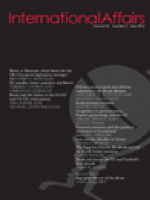We need to rethink radicalization
For more than a decade, ‘radicalization’ has been a keyword in our understanding of terrorism. From the outset, radicalization was conceived of as an intellectual process through which an individual would increasingly come under a spell of extremist ideas. This ideological understanding of radicalization still prevails. However, the way we understand radicalization has specific consequences for the way we manage and fight the scourge of terrorism.
Considering recent events, including the November 2016 Brussels attacks, the present article reconsiders this intellectualist understanding of radicalization and puts forward new suggestions of how radicalization may be understood today.
The article suggests that ideology is not necessarily a precondition for violence, but that a prior experience with violence is more often a precondition for engaging an extremist ideology. Such experience with violence can be both domestic and international, obtained in Europe or Syria or other conflict zones. In the second part of the article it is argued that although radicalization is often conceived of as an individual process, pathways towards terrorism are inherently social and political.
Finally, by stressing the importance of ideology and ideological processes, concepts of radicalization have abstracted away from another factor that is pivotal for understanding pathways towards terrorist violence: the skills and capacities of the body.
DIIS Experts


